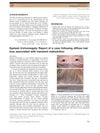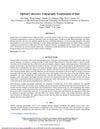 22 citations,
August 2006 in “Critical Reviews in Plant Sciences”
22 citations,
August 2006 in “Critical Reviews in Plant Sciences” The tropical legume Sesbania rostrata can form nodules in waterlogged conditions using a different method that involves plant hormones and specific genes.
 20 citations,
July 2009 in “Journal of Pediatric and Adolescent Gynecology”
20 citations,
July 2009 in “Journal of Pediatric and Adolescent Gynecology” Quick treatment of hair disorders in teenage girls is important because of the emotional effects.
 18 citations,
January 2020 in “Ecology and evolution”
18 citations,
January 2020 in “Ecology and evolution” Genes related to pigmentation, body rhythms, and behavior change during hares' seasonal coat color transition, with a common genetic mechanism in two hare species.
 18 citations,
May 2016 in “Annals of Medicine”
18 citations,
May 2016 in “Annals of Medicine” The article concludes that correctly diagnosing systemic causes of hair loss requires a detailed clinical evaluation and a systematic diagnostic approach.
 15 citations,
January 2019 in “Mediators of inflammation”
15 citations,
January 2019 in “Mediators of inflammation” Aloe vera fermentation helps heal burns faster by reducing inflammation and changing gut bacteria.
 14 citations,
November 2015 in “Annals of the New York Academy of Sciences”
14 citations,
November 2015 in “Annals of the New York Academy of Sciences” Changing the diet of mice lacking the enzyme CBS can affect symptoms related to the genetic condition.
 14 citations,
December 2010 in “Dermatologica Sinica”
14 citations,
December 2010 in “Dermatologica Sinica” New treatments for hair loss show promise, but more development is needed, especially for tough cases.
 11 citations,
August 2018 in “Facial Plastic Surgery Clinics of North America”
11 citations,
August 2018 in “Facial Plastic Surgery Clinics of North America” Adipose-derived stem cells show potential for skin rejuvenation and wound healing but require more research to overcome challenges and ensure safety.
 11 citations,
December 2014 in “Clinical Obstetrics and Gynecology”
11 citations,
December 2014 in “Clinical Obstetrics and Gynecology” Obstetrician/gynecologists can diagnose and manage female hair loss with careful history taking and examination.
 7 citations,
March 2005 in “British Journal of Dermatology”
7 citations,
March 2005 in “British Journal of Dermatology” Indian men have 62.1% hair loss, mostly grade II vertex, and less extensive than other populations.
 7 citations,
May 1978 in “International Journal of Dermatology”
7 citations,
May 1978 in “International Journal of Dermatology” Recent hair loss research shows some progress, especially in understanding male pattern baldness, but effective treatments for many types of hair loss are still lacking.

research Acne
4 citations,
January 2019 Acne is a common skin condition that can be influenced by diet, lifestyle, and hormones, and requires a treatment approach that includes psychological considerations.
 4 citations,
July 2013 in “Journal of dermatology”
4 citations,
July 2013 in “Journal of dermatology” Malnutrition can cause unusual eyelash growth and hair loss.
 4 citations,
May 1989 in “Journal of the Royal Society of Medicine”
4 citations,
May 1989 in “Journal of the Royal Society of Medicine” Crohn's disease can cause hair loss before other symptoms appear.
 4 citations,
January 2016 in “Journal of cosmetology & trichology”
4 citations,
January 2016 in “Journal of cosmetology & trichology” Excessive cell phone use may cause hair loss due to electromagnetic radiation.
 3 citations,
January 2016 in “Journal of cosmetology & trichology”
3 citations,
January 2016 in “Journal of cosmetology & trichology” Taking vitamins, minerals, and amino acids can improve hair strength and quality in people with Monilethrix.
 3 citations,
May 2002 in “Therapeutische Umschau”
3 citations,
May 2002 in “Therapeutische Umschau” The document concluded that cyproterone acetate and minoxidil are effective for female hair loss, and a supportive doctor-patient relationship is important.
 2 citations,
January 2017 in “Journal of Pigmentary Disorders”
2 citations,
January 2017 in “Journal of Pigmentary Disorders” Genetics, stress, and health issues can cause early hair greying, which affects self-esteem, and there's no cure, only hair dye.
 1 citations,
May 2017 in “InTech eBooks”
1 citations,
May 2017 in “InTech eBooks” Some cosmetic procedures show promise for treating hair loss, but more research is needed to confirm their safety and effectiveness.
 April 2024 in “bioRxiv (Cold Spring Harbor Laboratory)”
April 2024 in “bioRxiv (Cold Spring Harbor Laboratory)” A gene network led by RSL4 is crucial for early root hair growth in response to cold in Arabidopsis thaliana.
 February 2024 in “The Open dermatology journal”
February 2024 in “The Open dermatology journal” Alopecia Areata affects people of all ages worldwide, is likely caused by genetic and environmental factors, and can lead to stress and depression, highlighting the need for treatments that address both physical and mental health.
 November 2023 in “International journal of biology, pharmacy and allied sciences”
November 2023 in “International journal of biology, pharmacy and allied sciences” Herbal treatments can help with hair problems, but more research is needed.
 November 2023 in “Global journal of medical research”
November 2023 in “Global journal of medical research” Understanding the properties of hyaluronic acid helps improve its use in facial aging treatments.
 June 2023 in “Current Issues in Molecular Biology”
June 2023 in “Current Issues in Molecular Biology” DN106212, an extract from a plant, is better at promoting hair growth than other tested substances by affecting hair growth factors and follicle development.
 February 2023 in “Sibirskij onkologičeskij žurnal”
February 2023 in “Sibirskij onkologičeskij žurnal” Chemotherapy often causes hair loss in cancer patients, affecting their mental health, but scalp cooling can help prevent it.
 July 2022 in “International journal of dermatology, venereology and leprosy sciences”
July 2022 in “International journal of dermatology, venereology and leprosy sciences” More frequent and severe skin problems are linked to higher daily alcohol consumption.
 November 2019 in “Harper's Textbook of Pediatric Dermatology”
November 2019 in “Harper's Textbook of Pediatric Dermatology” Understanding normal hair growth and loss in children is key to diagnosing and treating hair disorders.

Accurate diagnosis and tailored treatments are crucial for managing hair loss in humans and animals.
 September 2014 in “Proceedings of SPIE, the International Society for Optical Engineering/Proceedings of SPIE”
September 2014 in “Proceedings of SPIE, the International Society for Optical Engineering/Proceedings of SPIE” OCT can effectively examine and reveal details about human hair and scalp conditions.
 June 2012 in “Springer eBooks”
June 2012 in “Springer eBooks” Eating disorders can cause various hair problems, and while hair loss in these disorders is linked to metabolic syndrome, treatment focuses on specific medications and lifestyle changes for the syndrome.






























